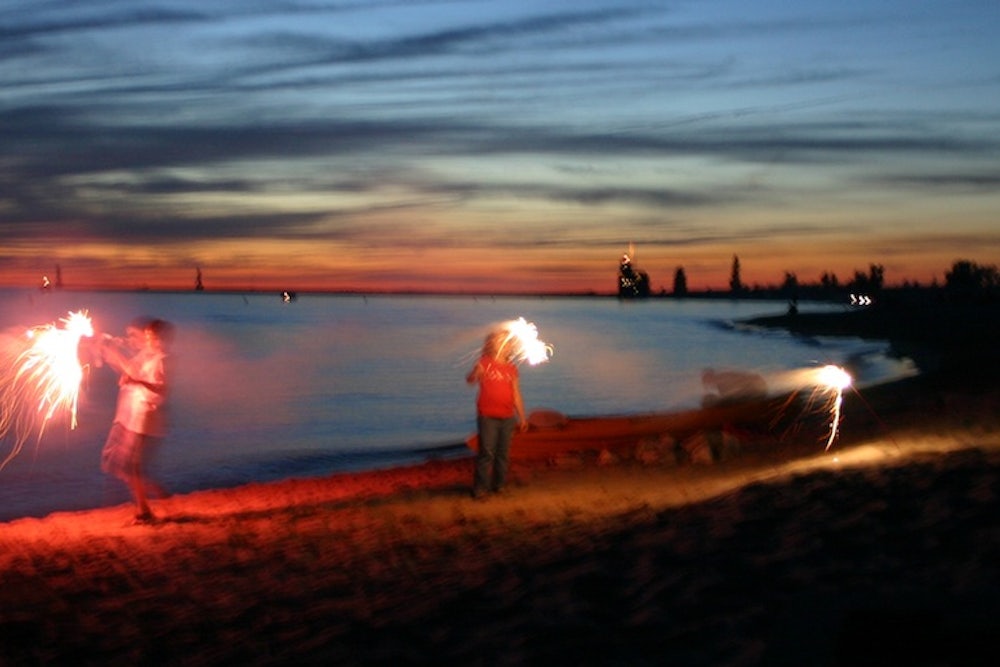I
The Ferry: The river is oily grey; downtown a grey dull wall. A railroad barge, propelled by a tug, conveys used and discolored freight-cars labeled Wabash and Reading. The tightening skies, grey and dull yellow, are distended with thunder. When they burst, they must strew larger, louder, more exciting and more extraordinary names.
II
The Sea: Outside the dry empty shadow of the bath-house, we squint into white and fierce blue. The soft sand oozes dryly from our toes, scorching our soles as we walk. Round blossoms of giant umbrellas confront us along the beach—solid red, awning-striped in white and green, melon- striped in yellow and madder. The blue water floats red bathing caps. Here we damp our feet where the sands have been darkened by the water; here we wade among silver nets. Stripling girls with straight necks and legs, tanned deeper than their bobbed tow-heads, in single slips of red or green, jump the waves or play ball on the beach; a boy with orange legs and arms slashes the blue in fast strokes of a crawl. We are melting in this heavy sun: to save our bodies we must cast them like his in hard orange bronze, we must immerse them in this blue molten metal white-cold about our knees which is yet not the statue but the mould. A wave has stung us and wetted us. Lie full length, repose in the cold. Watery mountains swell to meet us—we can climb them. They shake their fraying crests; the world is all white light and water. Alongshore—white walls—the slim piers—sea-flapping flag—fragile and blurred—the silver fringe—to sea, the stems—the fishing-nets—their grey stems—the grey sea—bury face—in grey sea.
III
A Train's Whistle: Hoo-hoo-oo, in the late afternoon, through the open countryside, unhuman, pressing and sad, intoning a moment a phantom countryside of sun and summer from beyond the verge of memory—green swamp rushes of Navesink with a thin yellow sand-strip for horizon—men sink crab-bait from motionless boats—sheer greenterraces over the river, with white flag-staffs on smooth lawns—a great silly white summer cottage with porte-cochères and a red cupola. Hoo-hoo—green lawns with big trees where the squirrels live as if forever like decent, industrious tenants—a hammock strung between the trees—H. C. Bunner—The Squirrel Inn—young ladies all in white, with long sleeves even in summer—they had had a picnic at Navesink—young men with straw hats and mustaches who came down from town on the boat—“I’ve a tale I long to tell, Sweet Marie”—Gottschalk as the man in Clyde Fitch who used to say, “I'm no Dodo bird!”— When someone was reading aloud the Tanglewood Tales and came to Hercules in the garden of the Hesperides, when he said, “Can you tell me, pretty maidens,”—all the grown-ups began to laugh—her frank clear American laugh—one never hears it any more—it must have been to that note they made love. Hoo-hoo-ooo-hoo! It fades in eager flight.
IV
The Boardwalk: Hot dogs roasted twenty at a time on an enormous open stove, dabbed gamboge with vivid mustard on long-handled wooden trowels. Soda, buttermilk, maple-nut sundaes, hot buttered popcorn, salt-water taffy; the burnt fragrance of molasses pulled on nickle-plated machinery. As we eat, dim and languid from the swim, brief reflections of girls in wide hats and bright summer colors shine in the silver high myriad-paned mirror—in the sun that bleaches whites whiter and blues and yellows white.
V
Fireworks: The sun has cooled yet everything is clear—the long sands are palest buff and the ocean greyest blue with the low waves like porcelain breaking frailest white between; the full moon, a shining buff, rises close and big. Tireless children, little blond girls and boys in pink or yellow pinafores, still slide squealing down their smooth, bumpy slides in interminable line. But now the last sandwich has been bolted, the last hard-boiled egg been peeled—the coffee is cold in the thermos bottle. They strew the sands with tissue-paper and leave the beach to the night. A shot is heard; all look up: the sky has darkened; a hiss of tinsel pierces the grey, showering violet and silver as it breaks its parabola. The deliberate reports of the mortars burst brooches of red, gold and green, falling bouquets that unfold in fresh clusters as the sprinkling flowers that gave rise to them fade—the loud detonation of a crowd of white electric stars. A scent of gunpowder singes the fresh fishy wind that bears in with the night from the sea—blowing shipboard, the dunes of Cape Cod, the hotels of Cannes out of season, sudden dark of Pacific spaces, the summer seaside of all the world. Children on the beach run down to the breaking waves, more savage and loud with the dark, and hold the brass-bristling frost-crystals of their sparklers out into the ocean and the night.
VI
Night: The last random pops and shots of the Fourth—the effortful spluttering and chugging up a hill—the last wild ride with hilarious yells on its way back to New York. Then the long even silence of summer that stretches darkness from sun to sun.
